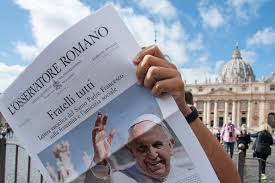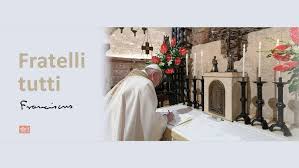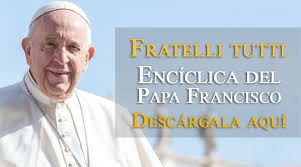Fratelli Tutti
Fratelli Tutti
 Pope Francis signed his new encyclical, Fratelli Tutti, on Saturday 3 October 2020 during a visit to Assisi. The phrase ‘Fratelli Tutti’ is taken from the writings of St. Francis, one of the major inspirations for Pope Francis’ third encyclical, on fraternity and social friendship. The full text of the encyclical, the third of Pope Francis’ pontificate was released on Sunday 4 October, the Feast of Saint Francis of Assisi.
Pope Francis signed his new encyclical, Fratelli Tutti, on Saturday 3 October 2020 during a visit to Assisi. The phrase ‘Fratelli Tutti’ is taken from the writings of St. Francis, one of the major inspirations for Pope Francis’ third encyclical, on fraternity and social friendship. The full text of the encyclical, the third of Pope Francis’ pontificate was released on Sunday 4 October, the Feast of Saint Francis of Assisi.
See “Fratelli Tutti: On Fraternity and Social Friendship”.
See also this post from the Irish Catholic Bishops’ Conference contains the full text of the encyclical letter and some useful links and resources: HERE
The Encyclical aims to promote a universal aspiration toward fraternity and social friendship. Beginning with our common membership in the human family, from the acknowledgement that we are brothers and sisters because we are the children of one Creator, all in the same boat.
The Document on Human Fraternity signed by Francis and the Grand Imam of Al-Azhar in February 2019 is an inspirational influence cited many times in the Encyclical, which opens with a brief introduction and is then divided into eight chapters. The Encyclical gathers – as the Pope himself explains – many of his statements on fraternity and social friendship, arranged, however, “in a broader context of reflection” and complemented by “a number of letters, documents” sent to Francis by “many individuals and groups throughout the world” .
 Various people from different cultural backgrounds presented Pope Francis’s new Encyclical “Fratelli Tutti” in the Vatican’s new Synod Hall on Sunday. The following quotations were compiled by Sr. Bernadette Mary Reis, fsp in her Vatican News Report See: Vatican News – Highlights from the presentation of ‘Fratelli Tutti’
Various people from different cultural backgrounds presented Pope Francis’s new Encyclical “Fratelli Tutti” in the Vatican’s new Synod Hall on Sunday. The following quotations were compiled by Sr. Bernadette Mary Reis, fsp in her Vatican News Report See: Vatican News – Highlights from the presentation of ‘Fratelli Tutti’
“Although I had accompanied the Pope and the Imam in the various stages of the journey of Human Fraternity over the last decade, when I read this Encyclical on Fraternity and Social Friendship, I identified a refined taste, an incisive sensibility and an ability to express the themes of human fraternity to the whole world. It is an appeal to concord to a world in discord, as well as a clear message in favour of both individual and collective harmony with the laws of the universe, the world and life. This notion relies on a clear reasoning that is rooted in the truth and is practicable in real life and in the real world.”
– Judge Mohamed Mahmoud Abdel Salam
“There are other ways of naming God. But the message Pope Francis wishes us to hear for this moment is that we are made fully human by what draws us beyond ourselves. What makes this possible is a divine love, open to all, that births, bonds, bridges and endlessly renews. This love cannot be erased or disposed of, and it is the basis of Pope Francis’s call to us with St Francis’s words of loving attention: Fratelli tutti…”.
– Professor Anna Rowlands
“The Encyclical shows us that we are all guardians of peace. Institutions have the task to reawaken the ‘architecture of peace’. However, we, normal people, cannot remain on the sidelines. The art of peace is everybody’s task: we must engage every day in daring and creative rebellion against war. If many can make war, all can be artisans of peace.” […]
 As I read Fratelli tutti, I see not only a condemnation of war, but also the hope that peace is possible. I remembered the invitation of John Paul II when he said together with other religious leaders in Assisi, on a glorious day back in 1986: ‘Peace awaits its prophets… its builders… peace is a workshop, open to all and not just to specialists, savants and strategists… it comes about in a thousand little acts in daily life.’ The artisans of peace are men and women of fraternity.”
As I read Fratelli tutti, I see not only a condemnation of war, but also the hope that peace is possible. I remembered the invitation of John Paul II when he said together with other religious leaders in Assisi, on a glorious day back in 1986: ‘Peace awaits its prophets… its builders… peace is a workshop, open to all and not just to specialists, savants and strategists… it comes about in a thousand little acts in daily life.’ The artisans of peace are men and women of fraternity.”
– Professor Andrea Riccardi
“I cannot read the Encyclical without emotion, especially chapter eight, “Religions at the Service of Fraternity in Our World.” I have collaborated with Pope Francis since the beginning of his pontificate, that is, for almost eight years now. I can attest to how much work has been done, even amid undeniable difficulties, including the most recent one, the pandemic caused by COVID-19.”
Interreligious dialogue is truly at the heart of the reflections and actions of Pope Francis. In fact, as Fratelli tutti states, ‘The effort to seek God with a sincere heart, provided it is never sullied by ideological or self-serving aims, helps us recognize one another as travelling companions, truly brothers and sisters’ (FT 274).”
– Cardinal Miguel Ayuso
Taken from https://presentationsistersne.ie/fratelli-tutti/

